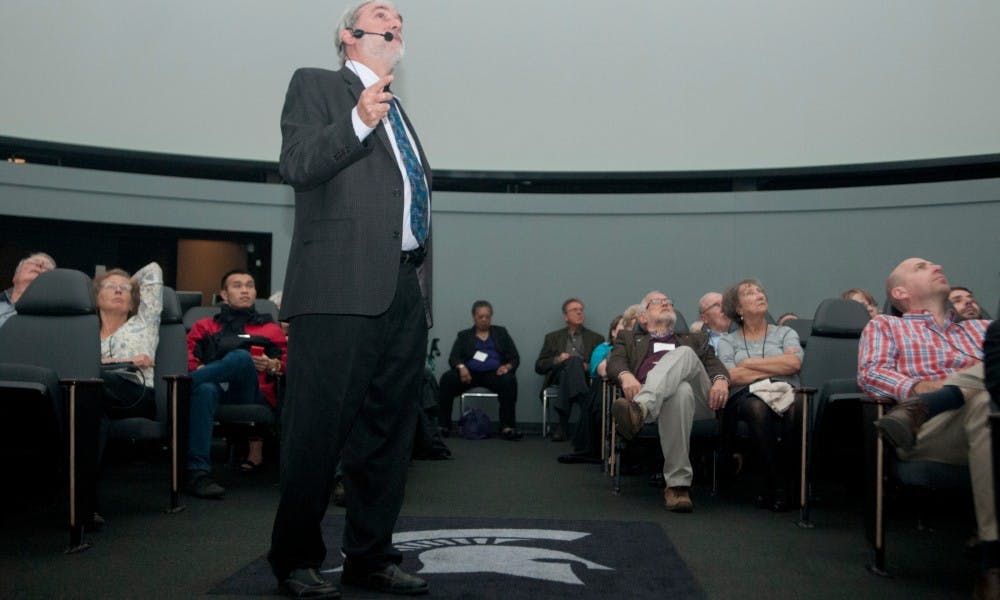Abrams Planetarium was shining bright this past Sunday with stars of the Greater Lansing United Nations Association.

Harvard University professor Daniel Nocera speaks to the crowd on Oct. 25, 2015 inside the Abrams Planetarium.
Abrams Planetarium was shining bright this past Sunday with stars of the Greater Lansing United Nations Association.
The planetarium was the venue for a gala celebrating the 70th anniversary of the ratification of the United Nations.
The highlight of the evening was MSU’s Department of Chemistry welcoming back former faculty member Daniel Nocera, who provided a keynote presentation on his invention, the Artificial Leaf.
Nocera is currently the Patterson Rockwood Professor of Energy at Harvard University and winner of the United Nation’s Science and Technology Award.
Nocera started his career as a chemistry professor here at MSU in 1983, and it was at MSU where he conceived his idea for the Artificial Leaf.
“When you do research, it’s a lifetime endeavor,” Nocera said. “When I first moved to Michigan State, I had this idea, ‘could I use solar light to power the world?' and started putting all the science together and finally enable the discovery of the artificial leaf. That science started here at Michigan State.”
Jim McCusker, a professor of chemistry at MSU and former colleague and friend of Nocera, said Nocera managed to develop a field of study through his research.
The field Nocera developed is called Proton-Coupled Electron Transfer, which McCusker described as a physical process that goes on in plants in order to convert sunlight into chemical energy.
His discovery at MSU gained traction and Nocera found himself garnering positions at the Massachusetts Institute of Technology, and then transitioning to his current position at Harvard University.
During his presentation “A Shining Sun for 1 X 6 Billion,” Nocera showcased his research and the motivations catalyzing it.
“That discovery was honored by the United Nations, because it can give energy to poor people,” Nocera said. “So I’ve been particularly interested in how I can get energy to the poor. The sun follows everybody around, so if you can figure out how to use the sun for energy then you can start thinking about delivering energy to the poor of the world.”
Nocera was asked to showcase his research at the gala because his worked aligned with the newly formed Sustainable Development Goals of the United Nations.
Michael Beard, the Executive Director of UNF Advocacy and Global Health Director of the Better World Campaign, provided the gala’s second keynote presentation and said having people like Nocera is a huge benefit to solving the world’s climate problem.
“There’s two parts to this — when you look at the sustainable development goals, there’s a piece on climate, there’s a piece on energy access,” Beard said. “If you focus on energy access, you could talk about very dirty energy and it’s access. But if you look at what Dr. Nocera is doing, you can get the climate change, plus the energy access, and that’s where you really find synergy that will take this to the next level.”
Lynn Bartley, President of the Greater Lansing United Nations Association, or GLUNA, was inspired by Nocera’s invention and research efforts and by what their global effects could be.
“When I just thought about (Nocera’s) research and how it could make that energy accessible to all, it made me so hopeful,” Bartley said. “It made me think this is possible. As Mike (Beard) said, when we meet people’s basic needs — if they are not living in poverty, if they have clean water, if they are not hungry, if they have power to be connected with the world and to be able to do what they need to, we will have a more peaceful world.”
Support student media! Please consider donating to The State News and help fund the future of journalism.
Here's a video of the leaf in action.